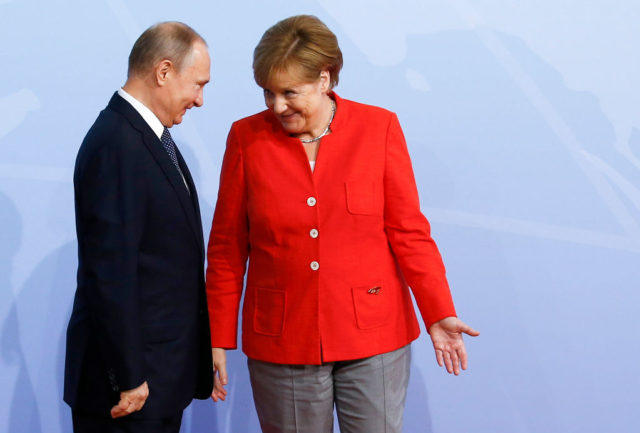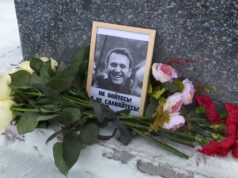
President Trump is taking flak for having introduced a subject to the G-7 meeting that our European friends wanted to keep under the table. Russia. The allies expressed horror when Mr. Trump said, “Why are we having a meeting without Russia? We have a world to run… We should have Russia at the negotiating table.”
Aside from the hyperbole over who actually runs the world, his comment and the allied response are only shocking if one thinks the Europeans have been boycotting Russia. There are sanctions on Moscow since it illegally invaded and seized Ukraine and Crimea, but sanctions are one thing and trade is another. Germany leads the pack in trade with Russia.
This may have something to do with the fact that Germany, in particular but not only, stays warm in the winter with Russian natural gas meeting about 40% of its requirements.
This is an old story. The Reagan administration objected to Russian-European plans to build the natural gas Yamal Pipeline from Siberia to Germany from which gas would be distributed to much of Western Europe. The American position was that, in the middle of the Cold War, having the USSR control a majority of the supply of natural gas to Germany’s industrial heartland would make it difficult for Germany to resist Russian political and military demands. But the Europeans wanted to sell Russia the machinery for the pipeline, making money as they mortgaged their energy future to Moscow.
After a bitter fight, the Yamal pipeline was partially blocked and only one strand of two was built. Post-Soviet, the Russians were able, with European support, to build the second strand. In the early 2000’s Europe bought into yet another Russian-originated pipeline — an undersea project called Nord Stream — again providing manufacturing jobs and pipeline work for Europe as well as gas.
Early in 2018, Bloomberg reported, “Russia, which shipped some $38 billion of gas to its most lucrative markets in Europe last year, has diminished thoughts that other suppliers could ensure supplies in Europe anytime soon.” Nord Stream, and its successor Nord Stream 2, will give Russia the same influence its predecessor, the USSR, would have had.
Russia is now a fine partner for Europe. The Vice President of the BundestagThomas Opperman said, “Nord Stream 2 is an important economic project, which we support and it should not be threatened by sanctions from third countries.” Mrs. Merkel would agree, no doubt, not only for the warmth, but because the pipeline will enter Germany at Greifswald in the old East Germany, part of her constituency.
The underwater Nord Stream 2 will reduce the price of natural gas by about 40% compared to overland pipelines, benefitting Germany, the UK, France, Belgium, and the Netherlands — among the countries most outspoken about the invasion of Ukraine. But to make Nord Stream 2 work, Gazprom has to get out of old contracts with Ukraine and Poland. Gazprom is presently suing Ukraine in the international arbitration court in Stockholm to cancel both its gas supply and transit contracts, stiffing Kiev. Ukraine won the first round, but Russia appealed. In the wake of the Ukrainian victory, the EU offered to “mediate” between the two.
Mediate away a favorable judgment for Ukraine? Isn’t this whole Russia-boycott project about Putin’s interference in Ukraine’s march to democracy? Talk about collusion.
So, now that we are clear on Germany and the EU’s interest in maintaining economic ties with Russia, consider why they are pretending to keep Putin out in the hallway. Russia, they say, is out because of its horrendous behavior in Ukraine, but — while no additional sanctions have been imposed for Russian support for the Syrian war criminal regime of Bashar Assad (which may make Moscow complicit in war crimes) — Syria is on European minds.
Germany, in particular, has had harsh words for Russia over its veto of 12 UN Security Council Resolutions on Syria. German Foreign Minister Heiko Maas told reporters, “We can’t go on like this… So, we’re keeping up the political pressure on Russia and we’d like to increase it further. Getting Russia to change its behavior is a condition for solving the Syria conflict.” Germany has backed allied air strikes on Syria as “necessary and appropriate.”
While claiming to be appalled by Russia’s behavior in Syria, however, Germany continues to push trade not only with Russia, but with Russia’s partner in the Syrian genocide, Iran.
European firms raced to enter Iran under the terms of the 2015 JCPOA; American firms were less aggressive. But since the U.S. has withdrawn from the never-signed deal, major European companies have been winding down or winding up operations in Iran. At the same time, though, the EU has begun to update its ” blocking statute,” the most powerful response it has to prevent European companies from complying with impending Iran sanctions.
In what Mrs. Merkel has said is a bid to “protect European companies” in Iran, the statute will nullify in Europe punishment the U.S. imposes for sanctions violations and allows EU companies to sue for damages caused by leaving Iran for fear of U.S. sanctions.
So, the EU will use its leverage to keep companies in a country, Iran, that hangs gay people from cranes in the street, holds American hostages, threatens democratic Israel with annihilation, participates fully in the Syrian genocide, and actively seeks nuclear weapons and ballistic missile technology.
And as Iran seeks military technology, Germany obliges.
In 2016, with government permission, the German company Krempel sold electronic press boards to Iranian companies. The German newspaper Bild reported that Krempel parts were discovered at the site of a Syrian government chemical attack on its civilian population. The Jerusalem Post said the technology was used in the rockets that delivered the chemicals. Krempel didn’t deny it, telling Bild the company was “shocked” to find its product in Syria.
A 2018 German intelligence report confirms that Iran is currently seeking nuclear technology in Germany.
Since the 2015 JCPOA, Germany, has been Iran’s largest European trading partner: 2.9 billion euros in 2016 according to the German government and 3.6 billion euros in 2017. Interestingly, the trade goes only one way: in 2016, Germany exported 2.6 billion euros worth to Iran and took back only 300 million euros. According to Deutsche Welle, Germany imports dried fruits, pistachios, rugs and industrial raw materials from Iran and sends machinery and equipment, cars, chemicals, pharmaceuticals and medical products, and takes back
Chemicals, machinery, industrial raw materials for Iran’s mullahs. What could go wrong?
In sum, then, President Trump’s faux pas appears to be having the temerity to suggest that Russia — a key German trading partner — have a place at the table for international trade talks. Perhaps it would be better to leave the hypocritical Germany out in the hallway.





